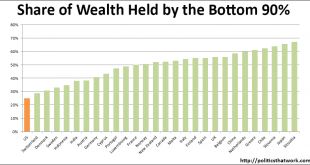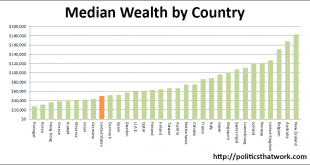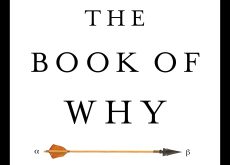Source: http://politicsthatwork.com/graphs/share-wealth-by-country
Read More »Median individual level of wealth by country
Sources: Credit Suisse Last updated: May 12, 2016
Read More »Why data is not enough to answer scientific questions
from Lars Syll Ironically, the need for a theory of causation began to surface at the same time that statistics came into being. In fact modern statistics hatched out of the causal questions that Galton and Pearson asked about heredity and out of their ingenious attempts to answer them from cross-generation data. Unfortunately, they failed in this endeavor and, rather than pause to ask “Why?”, they declared those questions off limits, and turned to develop a thriving, causality- free...
Read More »Open thread Aug. 10, 2018
The most unequal regions in the world
Can the electricity system be fixed ?
I’m going to be talking to Steve Austin on ABC 612 Brisbane today, hopefully about COAG’s rejection of the Turnbull government’s National Energy Guarantee. As I said when this policy was cooked up in a matter of a few weeks last year The most important thing to understand about the federal government’s new National Energy Guarantee is that it is designed not to produce a sustainable and reliable electricity supply system for the future, but to meet purely political objectives for the...
Read More »Minimum wages around the world
Source: https://gshindi.com/category/national-issues/minimum-wage-proposal-big-risk
Read More »Drawing the line
In my last post on Wednesday, I said it was time to draw a line against racism and, among other things, to boycott Sky until it cleans house thoroughly. As it turned out, I had to put up or shut up on this, much sooner than I expected. Yesterday, I was invited (by one of the few decent commentators on Sky) to take part in a debate on the National Energy Guarantee. As readers will know, I’m keenly interested in this topic, and would have liked to have my say, but I had to decline. If...
Read More »Rethinking public budget
from Lars Syll The balanced budget paradox is probably one of the most devastating phenomena haunting our economies. The harder politicians — usually on the advice of establishment economists — try to achieve balanced budgets for the public sector, the less likely they are to succeed in their endeavour. And the more the citizens have to pay for the concomitant austerity policies these wrong-headed politicians and economists recommend as “the sole solution.” One of the most effective ways...
Read More »Socialism or truth
from David Ruccio The liberal establishment continues to mourn the death of truth. Everyone else is moving on. Every day, it seems, one or another liberal—pundit, columnist, or scholar—issues a warning that, in the age of Donald Trump, we now live in a post-truth world. In their view, we face a fundamental choice: either return to a singular, capital-t truth or suffer the consequences of multiple sets of beliefs, facts, and truths. For example, just the other day, Keith Kahn-Harris [ht:...
Read More » Heterodox
Heterodox






